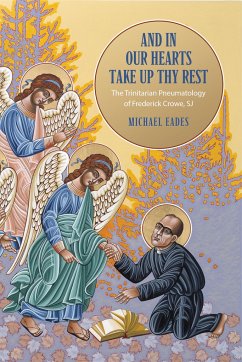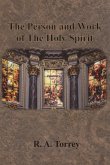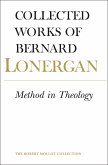- Gebundenes Buch
- Merkliste
- Auf die Merkliste
- Bewerten Bewerten
- Teilen
- Produkt teilen
- Produkterinnerung
- Produkterinnerung
This is the first book on the influential Canadian Jesuit, Frederick Crowe. The book presents his main contribution to theology, his creative and controversial theology of the Holy Spirit.
Andere Kunden interessierten sich auch für
![The Person and Work of The Holy Spirit The Person and Work of The Holy Spirit]() R a TorreyThe Person and Work of The Holy Spirit10,99 €
R a TorreyThe Person and Work of The Holy Spirit10,99 €![Authentic Fire: A Response to John Macarthur's Strange Fire Authentic Fire: A Response to John Macarthur's Strange Fire]() Michael L. BrownAuthentic Fire: A Response to John Macarthur's Strange Fire24,99 €
Michael L. BrownAuthentic Fire: A Response to John Macarthur's Strange Fire24,99 €![Method in Theology Method in Theology]() Bernard LonerganMethod in Theology56,99 €
Bernard LonerganMethod in Theology56,99 €![A Second Collection A Second Collection]() Bernard LonerganA Second Collection100,99 €
Bernard LonerganA Second Collection100,99 €![Archival Material Archival Material]() Lonergan Research InstituteArchival Material41,99 €
Lonergan Research InstituteArchival Material41,99 €![Archival Material Archival Material]() Lonergan Research InstituteArchival Material86,99 €
Lonergan Research InstituteArchival Material86,99 €![The Spiritual Life The Spiritual Life]() ANDREW MURRAYThe Spiritual Life12,99 €
ANDREW MURRAYThe Spiritual Life12,99 €-
-
-
This is the first book on the influential Canadian Jesuit, Frederick Crowe. The book presents his main contribution to theology, his creative and controversial theology of the Holy Spirit.
Hinweis: Dieser Artikel kann nur an eine deutsche Lieferadresse ausgeliefert werden.
Hinweis: Dieser Artikel kann nur an eine deutsche Lieferadresse ausgeliefert werden.
Produktdetails
- Produktdetails
- Lonergan Studies
- Verlag: University of Toronto Press
- Seitenzahl: 272
- Erscheinungstermin: 26. Juli 2019
- Englisch
- Abmessung: 231mm x 160mm x 23mm
- Gewicht: 586g
- ISBN-13: 9781487505592
- ISBN-10: 1487505590
- Artikelnr.: 55762596
- Herstellerkennzeichnung
- Libri GmbH
- Europaallee 1
- 36244 Bad Hersfeld
- gpsr@libri.de
- Lonergan Studies
- Verlag: University of Toronto Press
- Seitenzahl: 272
- Erscheinungstermin: 26. Juli 2019
- Englisch
- Abmessung: 231mm x 160mm x 23mm
- Gewicht: 586g
- ISBN-13: 9781487505592
- ISBN-10: 1487505590
- Artikelnr.: 55762596
- Herstellerkennzeichnung
- Libri GmbH
- Europaallee 1
- 36244 Bad Hersfeld
- gpsr@libri.de
By Michael Eades
List of Illustrations
Preface
Acknowledgments
Introduction
Methodology
Overview
Crowe's Confidence in the Psychological Analogy
Crowe’s Writings
1. Frederick Crowe, SJ: Dean of First Generation Lonergan Disciples
Early Years: New Brunswick and Jesuit Vocation
A Brief Sketch of Lonergan and Crowe’s Interactions
The Influence of Lonergan’s Writings on Crowe’s Pneumatology
Part I (1953-1968): Searching for the Proprium of the Holy Spirit
2. Appropriating Aquinas on Love: Proprium Emerging as a Theme
What Is Complacency?
Application of Complacency to the Doctrine of the Holy Spirit
3. Basil Helps to Extend the Search into the Economy of Salvation
Background to Crowe’s 1965-6 Doctrine of the Most Holy Trinity
Conceiving the Personal Properties of the Three in the Godhead as Never
Before
Discerning the Personal Property of the Three in the World
Part II (1969-84): Reversing the Relation of the Two Divine Missions
4. Who Provides the Context: The Son or the Spirit?
Background: The Relation of the Divine Missions in Crowe’s Earlier
Thinking
The Need to Rethink the Relation of the Missions
Full Thematization of the Reversal of the Missions
5. Arguing with Church Authorities as Helping to Reverse the Missions
Crowe’s Struggle with the Magisterium
Rethinking of the Role of the Spirit in Relation to the Son’s Mission
Part III (1985-2000): The Holy Spirit as the First Person in the Trinity
6. Intentionality Analysis: Paving the Way for Rethinking Trinitarian Order
Crowe’s Early Explanations of the Psychological Analogy
Emergence of the Question of the Holy Spirit’s Firstness
7. Hiding His Goal: Crowe’s Reordering of the Three Persons
Crowe’s Stated Reasons for Rethinking the Order of the Divine Persons
Trying to Win a Hearing: First Set of Concepts
Winning a Proposal: Second Set of Concepts
Pedagogical Purpose of the Two Sets of Concepts
Conclusion: Crowe’s Contribution as a Trinitarian Pneumatologist
The Root and Unity of the Three Stages
Stage One (1953-1968): Crowe’s Doctrine of Complacency
Stage Two (1969-1984): Evaluation of Crowe’s Reversing of the Missions
Stage Three (1985-2000): Evaluating Crowe’s Methodological Contribution
A Final Word
Notes
Bibliography
Index
Preface
Acknowledgments
Introduction
Methodology
Overview
Crowe's Confidence in the Psychological Analogy
Crowe’s Writings
1. Frederick Crowe, SJ: Dean of First Generation Lonergan Disciples
Early Years: New Brunswick and Jesuit Vocation
A Brief Sketch of Lonergan and Crowe’s Interactions
The Influence of Lonergan’s Writings on Crowe’s Pneumatology
Part I (1953-1968): Searching for the Proprium of the Holy Spirit
2. Appropriating Aquinas on Love: Proprium Emerging as a Theme
What Is Complacency?
Application of Complacency to the Doctrine of the Holy Spirit
3. Basil Helps to Extend the Search into the Economy of Salvation
Background to Crowe’s 1965-6 Doctrine of the Most Holy Trinity
Conceiving the Personal Properties of the Three in the Godhead as Never
Before
Discerning the Personal Property of the Three in the World
Part II (1969-84): Reversing the Relation of the Two Divine Missions
4. Who Provides the Context: The Son or the Spirit?
Background: The Relation of the Divine Missions in Crowe’s Earlier
Thinking
The Need to Rethink the Relation of the Missions
Full Thematization of the Reversal of the Missions
5. Arguing with Church Authorities as Helping to Reverse the Missions
Crowe’s Struggle with the Magisterium
Rethinking of the Role of the Spirit in Relation to the Son’s Mission
Part III (1985-2000): The Holy Spirit as the First Person in the Trinity
6. Intentionality Analysis: Paving the Way for Rethinking Trinitarian Order
Crowe’s Early Explanations of the Psychological Analogy
Emergence of the Question of the Holy Spirit’s Firstness
7. Hiding His Goal: Crowe’s Reordering of the Three Persons
Crowe’s Stated Reasons for Rethinking the Order of the Divine Persons
Trying to Win a Hearing: First Set of Concepts
Winning a Proposal: Second Set of Concepts
Pedagogical Purpose of the Two Sets of Concepts
Conclusion: Crowe’s Contribution as a Trinitarian Pneumatologist
The Root and Unity of the Three Stages
Stage One (1953-1968): Crowe’s Doctrine of Complacency
Stage Two (1969-1984): Evaluation of Crowe’s Reversing of the Missions
Stage Three (1985-2000): Evaluating Crowe’s Methodological Contribution
A Final Word
Notes
Bibliography
Index
List of Illustrations
Preface
Acknowledgments
Introduction
Methodology
Overview
Crowe's Confidence in the Psychological Analogy
Crowe’s Writings
1. Frederick Crowe, SJ: Dean of First Generation Lonergan Disciples
Early Years: New Brunswick and Jesuit Vocation
A Brief Sketch of Lonergan and Crowe’s Interactions
The Influence of Lonergan’s Writings on Crowe’s Pneumatology
Part I (1953-1968): Searching for the Proprium of the Holy Spirit
2. Appropriating Aquinas on Love: Proprium Emerging as a Theme
What Is Complacency?
Application of Complacency to the Doctrine of the Holy Spirit
3. Basil Helps to Extend the Search into the Economy of Salvation
Background to Crowe’s 1965-6 Doctrine of the Most Holy Trinity
Conceiving the Personal Properties of the Three in the Godhead as Never
Before
Discerning the Personal Property of the Three in the World
Part II (1969-84): Reversing the Relation of the Two Divine Missions
4. Who Provides the Context: The Son or the Spirit?
Background: The Relation of the Divine Missions in Crowe’s Earlier
Thinking
The Need to Rethink the Relation of the Missions
Full Thematization of the Reversal of the Missions
5. Arguing with Church Authorities as Helping to Reverse the Missions
Crowe’s Struggle with the Magisterium
Rethinking of the Role of the Spirit in Relation to the Son’s Mission
Part III (1985-2000): The Holy Spirit as the First Person in the Trinity
6. Intentionality Analysis: Paving the Way for Rethinking Trinitarian Order
Crowe’s Early Explanations of the Psychological Analogy
Emergence of the Question of the Holy Spirit’s Firstness
7. Hiding His Goal: Crowe’s Reordering of the Three Persons
Crowe’s Stated Reasons for Rethinking the Order of the Divine Persons
Trying to Win a Hearing: First Set of Concepts
Winning a Proposal: Second Set of Concepts
Pedagogical Purpose of the Two Sets of Concepts
Conclusion: Crowe’s Contribution as a Trinitarian Pneumatologist
The Root and Unity of the Three Stages
Stage One (1953-1968): Crowe’s Doctrine of Complacency
Stage Two (1969-1984): Evaluation of Crowe’s Reversing of the Missions
Stage Three (1985-2000): Evaluating Crowe’s Methodological Contribution
A Final Word
Notes
Bibliography
Index
Preface
Acknowledgments
Introduction
Methodology
Overview
Crowe's Confidence in the Psychological Analogy
Crowe’s Writings
1. Frederick Crowe, SJ: Dean of First Generation Lonergan Disciples
Early Years: New Brunswick and Jesuit Vocation
A Brief Sketch of Lonergan and Crowe’s Interactions
The Influence of Lonergan’s Writings on Crowe’s Pneumatology
Part I (1953-1968): Searching for the Proprium of the Holy Spirit
2. Appropriating Aquinas on Love: Proprium Emerging as a Theme
What Is Complacency?
Application of Complacency to the Doctrine of the Holy Spirit
3. Basil Helps to Extend the Search into the Economy of Salvation
Background to Crowe’s 1965-6 Doctrine of the Most Holy Trinity
Conceiving the Personal Properties of the Three in the Godhead as Never
Before
Discerning the Personal Property of the Three in the World
Part II (1969-84): Reversing the Relation of the Two Divine Missions
4. Who Provides the Context: The Son or the Spirit?
Background: The Relation of the Divine Missions in Crowe’s Earlier
Thinking
The Need to Rethink the Relation of the Missions
Full Thematization of the Reversal of the Missions
5. Arguing with Church Authorities as Helping to Reverse the Missions
Crowe’s Struggle with the Magisterium
Rethinking of the Role of the Spirit in Relation to the Son’s Mission
Part III (1985-2000): The Holy Spirit as the First Person in the Trinity
6. Intentionality Analysis: Paving the Way for Rethinking Trinitarian Order
Crowe’s Early Explanations of the Psychological Analogy
Emergence of the Question of the Holy Spirit’s Firstness
7. Hiding His Goal: Crowe’s Reordering of the Three Persons
Crowe’s Stated Reasons for Rethinking the Order of the Divine Persons
Trying to Win a Hearing: First Set of Concepts
Winning a Proposal: Second Set of Concepts
Pedagogical Purpose of the Two Sets of Concepts
Conclusion: Crowe’s Contribution as a Trinitarian Pneumatologist
The Root and Unity of the Three Stages
Stage One (1953-1968): Crowe’s Doctrine of Complacency
Stage Two (1969-1984): Evaluation of Crowe’s Reversing of the Missions
Stage Three (1985-2000): Evaluating Crowe’s Methodological Contribution
A Final Word
Notes
Bibliography
Index








